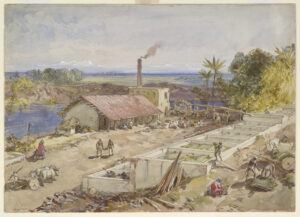“Raktakarabi: A Symbolic Rebellion Against Tyranny“
Rabindranath Tagore’s Raktakarabi (Red Oleanders) is a profound allegorical play that critiques the dehumanizing effects of industrial greed and authoritarian control. Set in the fictional kingdom of Yakshapuri, the story follows Nandini, a symbol of life, beauty, and resistance, as she challenges a mechanized society obsessed with wealth and power. Through poetic dialogue and symbolic characters, Tagore explores themes of freedom, individuality, and the spiritual cost of materialism. First published in 1924, Raktakarabi remains a timeless reflection on the struggle between human values and oppressive systems—making it a cornerstone of Bengali literary theatre and a compelling subject for modern readers and theatre enthusiasts alike.
🌺 Main Themes in “Raktakarabi: A Symbolic Rebellion Against Tyranny”
Rabindranath Tagore’s Raktakarabi (Red Oleanders) is a richly layered allegorical play that critiques authoritarianism and industrial greed through poetic symbolism and humanistic philosophy. Here are its central themes:
🛑 Tyranny and Dehumanization
Set in the fictional Yakshapuri, the play exposes how authoritarian regimes reduce individuals to mere tools of production. The faceless King and his bureaucratic machinery represent a system that crushes freedom and identity in pursuit of wealth.
🌱 Rebellion and Liberation
Nandini, the protagonist, embodies the spirit of resistance. Her presence awakens the oppressed miners and even stirs the conscience of the tyrant. She becomes a catalyst for rebellion—not through violence, but through truth, beauty, and moral courage.
💰 Critique of Materialism and Industrial Greed
The obsession with gold in Yakshapuri symbolizes the destructive nature of unchecked capitalism. Tagore critiques how material wealth, when prioritized over human values, leads to spiritual decay and societal collapse.
🌸 Nature vs. Mechanization
The red oleander (raktakarabi) itself is a symbol of life, beauty, and resilience. It stands in stark contrast to the cold, mechanical world of the mines, suggesting that nature and humanity must prevail over soulless industry.
🧬 Individual Conscience and Moral Awakening
The play explores how even those complicit in oppression—like the King—can experience inner transformation. Nandini’s influence reveals the redemptive power of conscience and the possibility of change from within.





